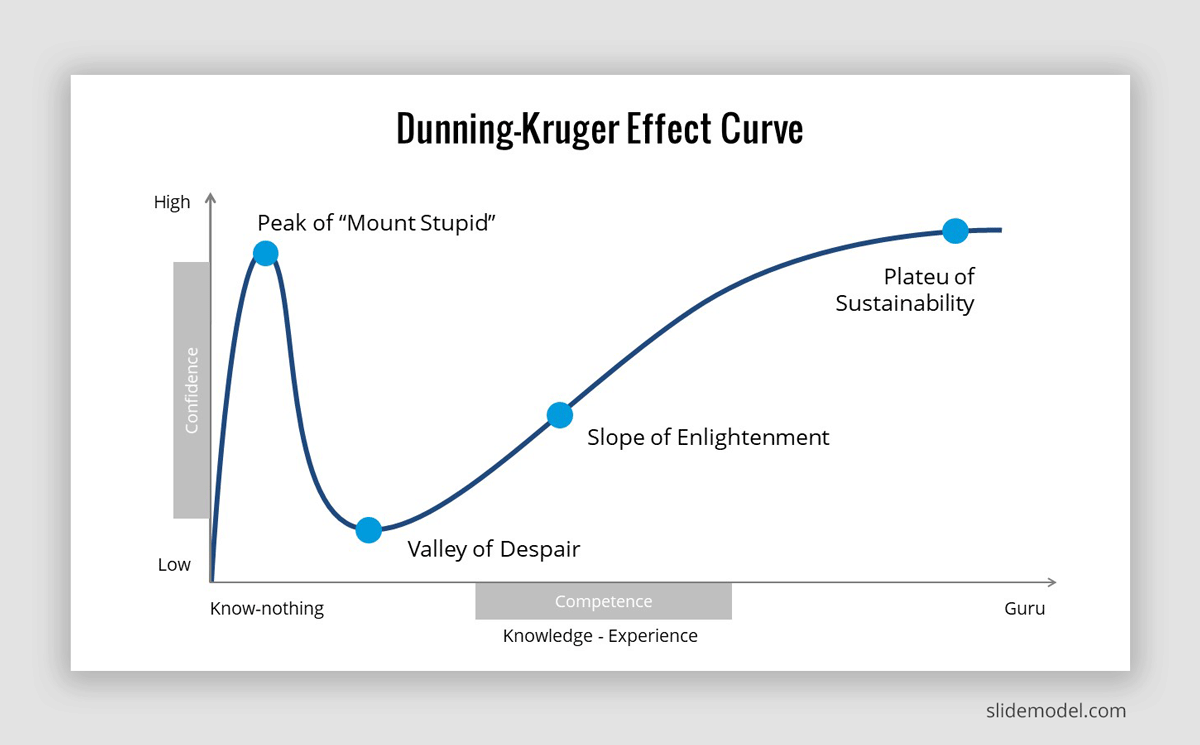So you’ve just paid more than $10,000 for a course that heavily implies you’ll be job ready when you’ve finished. When you graduate you’ll feel like you’re on top of the world, they’ll help to place you in a job, but is it what you expected?
Having talked to a number of people who have graduated from bootcamps it seems that most providers present their offering as an all inclusive fast-track to becoming a senior developer. Many graduates expect they can immediately step in to the industry and get a job paying in excess of $100k/year. Unfortunately this isn’t the case. Don’t be disheartened.
A coding bootcamp will give you an overview of the work required to be a developer; you’ll get a lot of hands-on experience developing code; but you will only be at a base level of knowledge.
As you progress through your career and assuming you choose to get into a people management path you will learn about the Dunning-Kruger Effect. To briefly explain, as your competence increases you confidence skyrockets; at a certain point you suddenly realise how little you actually know and your confidence plummets; then, as your competence continues to increase so does your confidence. Most articles and graphs about the Dunning-Kruger Effect label the highest level of confidence before the fall as the “Peak of Mount Stupid”; this is followed by the “Valley of Despair” and that leads to the “Slope of Enlightenment”. When you finish your bootcamp you’ll be somewhere near the “Peak of Mount Stupid,” you know the basics, you are confident, but you don’t yet know what you don’t know.

As you step in to the workforce and start dealing with other developers you will quickly fall in to the “Valley of Despair”. This is normal, and occurs for most developers when they first enter the industry. Personally I think of the “Valley of Despair” as the point at which you move from being a graduate developer to a junior developer, you’ve recognised just how much you don’t know.
Now all of this may sound rather bleak; but it isn’t. At this point I will digress slightly to talk about part of my career journey, sure the IT world was a very different place when I started my career, but that doesn’t mean it was any better. As a teen I was considered a computer geek. Amongst my friends I was considered extremely knowledgeable about computers. The Internet wasn’t yet mainstream. So after leaving high school and venturing out in to the world I ended up starting an Internet access provider. I didn’t realise at the time that I was at the “Peak of Mount Stupid”; I honestly thought I knew more than enough to run a hugely successful business. I think the only thing that saved me from being a complete failure in this role was that the Internet was gaining popularity and momentum and it was extremely hard to fail. I fell in to the “Valley of Despair” with no one to help me gain competence. Somehow I kept going (maybe it was the threat of bankruptcy at just 18 years old), and I pushed through. Today the world is a different place, employers will hire graduates with the knowledge they are at the “Peak of Mount Stupid”; they know the next step is into the abyss as you suddenly realise how little you actually know; they also have a team of more senior developers that will be able to help you and guide you along the “Slope of Enlightenment”.
It’s also worth remembering that the entry-level wage for a software developer is over 2/3rds of the national average wage. Within 5 years you will likely be earning more than the national average. Most employers in IT offer a heap of additional benefits compared to other industries as well; you’ll likely get a learning and development budget, some places offer free food and coffee, social events are a regular occurrence, you can easily work from home (or anywhere really), and often get to keep your own schedule. Not bad for a first job really.
So, why am I writing this article? Well, partly it’s because I’m frustrated with bootcamp graduates thinking they’re senior, but it’s also to help prepare you for what lies ahead. Come to your interviews recognising that your confidence is way higher than it should be; expect to crash and burn in the first few weeks and months; be prepared to learn at a pace that is far more rapid than any bootcamp or intensive; know that you will fail a lot. But also be prepared to have a lot of fun; expect a supportive environment; expect to learn from your failures; be prepared to absorb knowledge. You’re laying the foundation of an amazing career, don’t be put off by the early challenges.
- If you own the "Dunning-Kruger" image used in this article and would like credit or would like it removed please email me.
